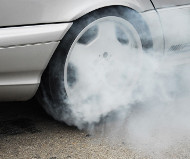3/28/2017
Kansas Supreme Court Clears Man Charged With Stoplight BurnoutYou cannot have a drag race or an exhibition of speed without moving, Kansas Supreme Court rules.

A quick stoplight burnout, while stationary, is not an "exhibition of speed," the Kansas Supreme Court ruled earlier this month. A majority of justices came to this conclusion in finding that Officer Donald Bowers lacked the authority to pull over Travis Sharp on January 25, 2013 after he briefly spun his SUV's tires at a stoplight.
Officer Bowers testified that he believed Sharp was spinning his SUV tires at the busy intersection in preparation for a drag race. When the light turned green, however, the SUV entered the intersection at a perfectly normal, legal speed. Once they had cleared the intersection, Officer Bowers activated the overhead lights on his squad car and ordered Sharp to pull over.
At trial, prosecutors argued the wheel spinning was an "exhibition of the power, endurance and capabilities" of the SUV. Sharp countered that the evidence used against him should be thrown out because the state's exhibition of speed law is unconstitutionally vague.
"No person shall drive any vehicle in any race, speed competition or contest, drag race or acceleration contest, test of physical endurance, exhibition of speed or acceleration, or for the purpose of making a speed record, and no person shall in any manner participate in any such race, competition, contest, test or exhibition," Kansas Statutes 8-1565 states.
In 1978, the high court threw out the city of Altamont's exhibition of speed ordinance, which was similar to the current state statute. A lower court disagreed that this case applied to the circumstances at hand and found Sharp guilty. The Court of Appeals reversed that decision, pointing out that the clear words of the statute "denote movement." The Supreme Court endorsed the appellate panel's judgment.
"Although Bowers testified he thought Sharp was preparing his tires to drag race, a trained law enforcement officer would realize this concern was unwarranted once Sharp was observed proceeding lawfully after the light turned green," Judge Michael J. Malone wrote for the high court. "In evaluating whether reasonable suspicion of past, present, or future criminal activity exists to validate a traffic stop, officers can neither ignore certain facts nor stop considering ongoing circumstances... Indeed, if law enforcement officers were allowed to cherry-pick certain facts, they would be able to operate with unbridled discretion to conduct traffic stops with impunity."
The justices did not agree, however, that the racing statute was overly vague. The decision overturned Sharp's conviction for exhibition of speed and driving under the influence of alcohol (DUI). A copy of the ruling is available in a 130k PDF file at the source link below.


